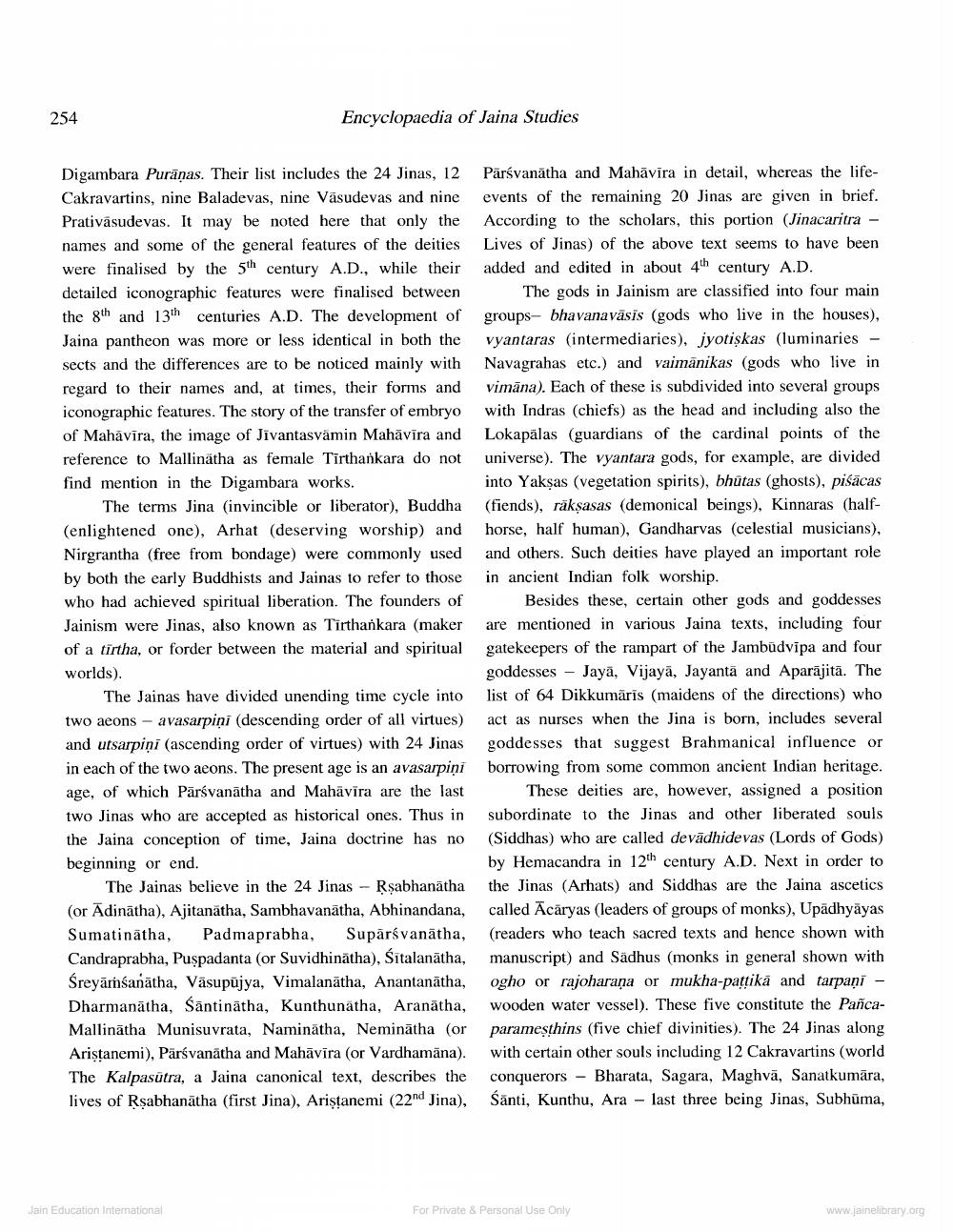________________
254
Encyclopaedia of Jaina Studies
Digambara Puranas. Their list includes the 24 Jinas, 12 Pārsvanātha and Mahavira in detail, whereas the lifeCakravartins, nine Baladevas, nine Väsudevas and nine events of the remaining 20 Jinas are given in brief. Prativasudevas. It may be noted here that only the According to the scholars, this portion (Jinacaritra - names and some of the general features of the deities Lives of Jinas) of the above text seems to have been were finalised by the 5th century A.D., while their added and edited in about 4th century A.D. detailed iconographic features were finalised between The gods in Jainism are classified into four main the 8th and 13th centuries A.D. The development of groups, bhavanavāsis (gods who live in the houses), Jaina pantheon was more or less identical in both the vyantaras (intermediaries), jyotişkas (luminaries - sects and the differences are to be noticed mainly with Navagrahas etc.) and vaimānikas (gods who live in regard to their names and, at times, their forms and vimāna). Each of these is subdivided into several groups iconographic features. The story of the transfer of embryo with Indras (chiefs) as the head and including also the of Mahāvīra, the image of Jivantasvämin Mahāvīra and Lokapālas (guardians of the cardinal points of the reference to Mallinätha as female Tirthankara do not universe). The vyantara gods, for example, are divided find mention in the Digambara works.
into Yakşas (vegetation spirits), bhūtas (ghosts), pisacas The terms Jina (invincible or liberator), Buddha (fiends), rākşasas (demonical beings), Kinnaras (half(enlightened one), Arhat (deserving worship) and horse, half human), Gandharvas (celestial musicians), Nirgrantha (free from bondage) were commonly used and others. Such deities have played an important role by both the early Buddhists and Jainas to refer to those in ancient Indian folk worship. who had achieved spiritual liberation. The founders of Besides these, certain other gods and goddesses Jainism were Jinas, also known as Tirthankara (maker are mentioned in various Jaina texts, including four of a tirtha, or forder between the material and spiritual gatekeepers of the rampart of the Jambüdvipa and four worlds).
goddesses - Jaya, Vijaya, Jayanta and Aparajitä. The The Jainas have divided unending time cycle into list of 64 Dikkumāris (maidens of the directions) who two aeons - avasarpini (descending order of all virtues) act as nurses when the Jina is born, includes several and utsarpiņi (ascending order of virtues) with 24 Jinas goddesses that suggest Brahmanical influence or in each of the two aeons. The present age is an avasarpiņi borrowing from some common ancient Indian heritage. age, of which Pārsvanātha and Mahävīra are the last These deities are, however, assigned a position two Jinas who are accepted as historical ones. Thus in subordinate to the Jinas and other liberated souls the Jaina conception of time, Jaina doctrine has no (Siddhas) who are called devādhidevas (Lords of Gods) beginning or end.
by Hemacandra in 12th century A.D. Next in order to The Jainas believe in the 24 Jinas - Rşabhanātha the Jinas (Arhats) and Siddhas are the Jaina ascetics (or Adinātha), Ajitanätha, Sambhavanātha, Abhinandana, called Ācāryas (leaders of groups of monks), Upadhyāyas Sumatinātha, Padmaprabha, Supārsvanātha, (readers who teach sacred texts and hence shown with Candraprabha, Puşpadanta (or Suvidhinātha), Sitalanātha, manuscript) and Sadhus (monks in general shown with Śreyāmšanātha, Väsupujya, Vimalanātha, Anantanātha, ogho or rajoharaṇa or mukha-pattikā and tarpaņi - Dharmanātha, Santinātha, Kunthunatha, Aranātha, wooden water vessel). These five constitute the PancaMallinātha Munisuvrata, Naminātha, Neminātha (or paramesthins (five chief divinities). The 24 Jinas along Aristanemi), Pärsvanātha and Mahāvīra (or Vardhamāna). with certain other souls including 12 Cakravartins (world The Kalpasūtra, a Jaina canonical text, describes the conquerors - Bharata, Sagara, Maghvä, Sanatkumāra, lives of Rşabhanātha (first Jina), Aristanemi (22nd Jina), Santi, Kunthu, Ara - last three being Jinas, Subhūma,
Jain Education Intemational
For Private & Personal Use Only
www.jainelibrary.org




